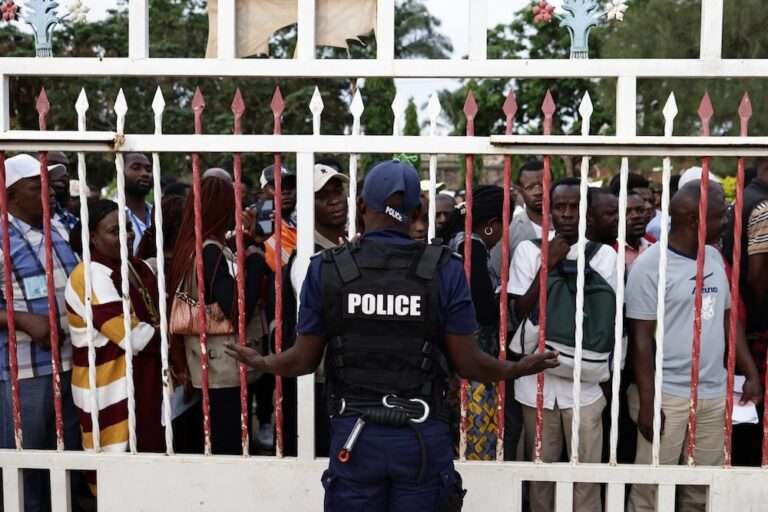(JED/IFEX) – The following is a 27 July 2001 JED press release: Kinshasa, 27 July 2001 In a letter to Kikaya bin Karubi, minister of communications and press, dated Friday 27 July 2001, Journaliste en danger (JED), a non-governmental organisation dedicated to the defence and promotion of press freedom in the Democratic Republic of Congo […]
(JED/IFEX) – The following is a 27 July 2001 JED press release:
Kinshasa, 27 July 2001
In a letter to Kikaya bin Karubi, minister of communications and press, dated Friday 27 July 2001, Journaliste en danger (JED), a non-governmental organisation dedicated to the defence and promotion of press freedom in the Democratic Republic of Congo (DRC), asked him to abandon his plan to force independent radio and television stations to encrypt their programmes, as a means of eliminating broadcasts of alleged and real misinformation by a few audio-visual media outlets. JED added that “at the very moment when President Joseph Kabila is promising to whomever wants to listen that he will respect human rights, protect public and private freedoms and ensure legal and judicial security, your [encryption] plan constitutes a clear repudiation of these stated aims.”
JED told the minister that his “plan consititutes a flagrant violation of press freedom and a serious attack on the public’s right to information pluralism.” These rights are established in Congolese Press Law 96-002 of 22 June 1996. The organisation also noted that “if they are concretised, his intentions will take the DRC light years back just as the world is changing and that in this very area, our country is ahead of many other countries on the continent.”
JED notes that following the September 2000 confiscation of two private stations (RTKM and Canal Kin), the Congolese state directly controls four radio and television stations, thereby becoming the largest stakeholder in the sector. As a consequence of the state takeover, there is a danger that the public will be limited to formal and one-dimensional information. JED concluded that “by seeking to impose encryption on private stations, the government hopes to remain the only source of audio-visual information in the DRC.”
In his 22 July 2001 speech marking the 30th Congolese Press Day, Kikaya bin Karubi denounced “the anarchic operation of audio-visual space by private, religious, denominational or thematic radio and television stations, which broadcast demobilising programmes for citizens all day long and programmes that incite young people and women to debauchery, idleness and easiness, by promising low-cost pleasures, joy and miracles.” In order to solve this problem, the minister said that “while we await the setting up of the National Audio-visual Council, the ministry [of communications and press] will be forced to introduce bills and rules which will force operators of these [independent radio and television] stations to encrypt their broadcasts or deliver them via cable, instead of using unscrambled signals, as is the case at present.”


